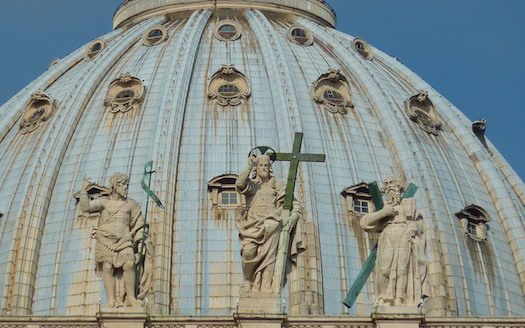
God asked Abraham (Gn 12:1-4) to leave his land, take everything and everyone with him and move to a new land. Later God asked Moses to take the Hebrews from Egypt into a promised new land. And Jesus? Well, He too had to leave Joseph and Mary back in Nazareth and begin his mission out on the road. Jesus once remarked: “The foxes have their dens and the birds of the air their nests, but the Son of Man has no place to lay his head.” And when He was crucified and died, He didn’t even have a tomb of His own.
One of the hardest things I face as a priest is not having my own home, a place I can call my own. My only home is the Church. My only family is all of you… along with all of the other members of Christ’s family throughout the world.
Many people today experience homelessness. Lots of people, even young kids, live out in the streets. Many members of gangs belong to gangs because they are looking for family, for someone to belong to, for a “home” that they feel they never had with their moms and dads if, that is, they even know who their mothers were and know who their fathers are. A great deal of the trouble in the schools of our big cities comes from the countless numbers of children within them that have no place they can really call home, no family that they can truly call their own – except perhaps the gang that has accepted them and taken them in.
Many of us as adults and parents also feel like we are in a lot of ways strangers and exiles living in an alien and hostile culture, or environment, or world. Quite a few feel that it’s not possible to be a good Christian, or a total and complete Christian, or Catholic, and at the same time live in the sort of world in which we find ourselves. They feel like the standards of our culture are being “dumbed down,” that our laws and rules are being redefined so that people can do simply what they feel like doing. Many of us watch what we value as it is being de-valued in the world around us, a world in which we no longer feel at home, much less want to raise our children.
The feeling is not new; the feeling is, as a matter of fact, quite old. In a time when Christians were being hounded down, chased out of town, marginalized and even arrested and killed. St. Peter wrote in one of his Epistles that we must remember we are strangers living in exile, that our citizenship and our real home is not in this world but rather in God’s kingdom. St. Paul, too, wrote in one of his Epistles that “we have here no lasting city,” and that our citizenship is in heaven after our sojourn here in earth is ended.
Nevertheless, God wants us to have roots, to have a place, to belong. We all need a place in which we can find ourselves and a family in which we can belong. If we don’t have that we become very angry, act out, and engage in what is called “anti-social” and hostile behavior. In other words, in our rage at not belonging we end up attacking everyone around us. One of the remarkable things about the Catholic Church is the fact that in it you belong no matter where you find yourself on the face of the earth. I have entered churches in many other parts of the world, participated in Masses in them, and instantly felt at home even though the language wasn’t English (or Latin, for that matter). It’s a wonderful feeling to enter St. Peter’s basilica in the Vatican and be able to say: “This is my church!” I’ve entered great cathedrals all over Europe and been able to say: “I feel at home here. This is my church. Jesus is here in the Blessed Sacrament. These people represented in statues stained glass windows are a part of my family and I belong to them just as they belong to me.”
Likewise we need to be able to respond to God the way others have when He called them to be about His tasks, to be about His purposes, to accomplish His work. Could you leave everything in back of you if He called you to make a radical change in your life? Like Abraham, you would have to leave your security and your familiar surroundings behind you. Sometimes God calls you to empty yourself in order that He might fill you with what He wants to give you. Could you do it?
There’s a story about a Sufi Master who was approached by a young man who wanted to be his disciple. To impress the Master the prospect went on and on and on about his academic achievements, his experience and about all of his accomplishments in serving and helping people. The Master listened in silence. Then while the young man was running on and on and on about all the he had done the Master began to fill a teacup with tea. When the cup was filled he kept filling it with more tea until it spilled all over. “Stop, Master!” cried the young man, “the cup can’t hold any more tea.”. To which the Master replied: “Neither can I teach you anything. You are too full of yourself now. Come back when you’ve made some room within you to hold a new thought.”
Abraham made new room for God. So did Moses. And Jesus totally emptied himself in order to be completely filled with God’s Holy Spirit.
We speak of Lent as a journey, a moving from one place to a new and better place. We follow in the footsteps of Jesus from Bethlehem where He was born, to Nazareth where He was raised, out into the desert, then to Jerusalem where He was crucified and died, and into the tomb in which He was buried, and then into the Garden of the Resurrection, the new Garden of Eden. One day we will follow in His path by joining Him in His Ascension into heaven along with the Assumption of His mother Mary who was also taken up from this alien world into the home God has prepared for us.
The tomb of Jesus is empty because the things of this world are all destined to turn into dust. Inside of them, all of the things of this world are as empty as the tomb of Jesus. Why? Because reality is something spiritual, not material. We are dust, and unto dust we shall return, along with all of the glitter of this world. Our citizenship and our home are elsewhere and our hearts will not rest until they rest in the home God has prepared for us.
Our hearts can experience some of that peace, some of that rest, right here in this church, in God’s house, in His Presence here in the Blessed Sacrament of the Altar. Why not stop in here to be at home for a little while with Jesus, here in His house? Why not give your heart the love it seeks, namely to be here at peace and in union, in love, with the One for whom your heart was made by God in the first place?
To whom do I belong? Where is my home? Here at least, here in God’s house in the Presence of Jesus Christ in the Blessed Sacrament of the altar, you will be strangers and exiles no longer. This is God’s house, and therefore it is your house, your home. This is where your family shares its Sunday meal and where, whenever we come here, we know at last we belong.








